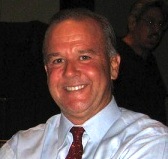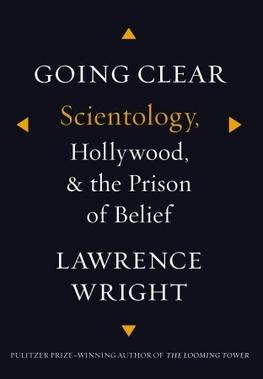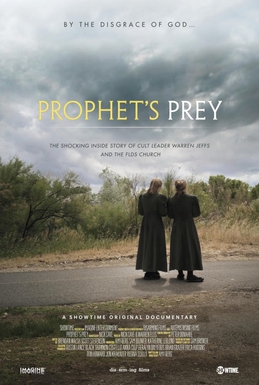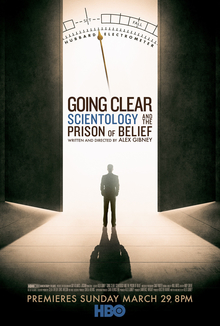
David Miscavige is an American Scientologist who is serving as the second and current leader of the Church of Scientology. His official title within the organization is Chairman of the Board of the Religious Technology Center. RTC is a corporation that controls the trademarks and copyrights of Dianetics and Scientology. He is also referred to within the Scientology organization as "DM", "COB", and "Captain of the Sea Org".

Paul Edward Haggis is a Canadian screenwriter, film producer, and director of film and television. He is best known as screenwriter and producer for consecutive Best Picture Oscar winners Million Dollar Baby (2004) and Crash (2005), the latter of which he also directed. Haggis also co-wrote the war film Flags of Our Fathers (2006) and the James Bond films Casino Royale (2006) and Quantum of Solace (2008). He is the creator of the television series Due South (1994–1999) and co-creator of Walker, Texas Ranger (1993–2001), among others. Haggis is a two-time Academy Award winner, two-time Emmy Award winner, and seven-time Gemini Award winner. He also assisted in the making of "We Are the World 25 for Haiti". In November 2022, he was found liable in a civil trial which alleged he raped publicist Haleigh Breest, and was required to pay $10 million in damages.

The Church of Scientology is a group of interconnected corporate entities and other organizations devoted to the practice, administration and dissemination of Scientology, which is variously defined as a cult, a business, or a new religious movement. The movement has been the subject of a number of controversies, and the Church of Scientology has been described by government inquiries, international parliamentary bodies, scholars, law lords, and numerous superior court judgements as both a dangerous cult and a manipulative profit-making business.

Mark C. "Marty" Rathbun is a former senior executive of the Church of Scientology who last held the post of Inspector General of the Religious Technology Center (RTC), the organization that is responsible for the protection and enforcement of all Dianetics and Scientology copyrights and trademarks.

Philip Alexander Gibney is an American documentary film director and producer. In 2010, Esquire magazine said Gibney "is becoming the most important documentarian of our time."

Michael John Rinder is an Australian-American former senior executive of the Church of Scientology International (CSI) and the Sea Organization based in the United States. From 1982 to 2007, Rinder served on the board of directors of CSI and also held the post of executive director of its Office of Special Affairs, overseeing the corporate, legal and public relations matters of Scientology at the international level.

The Church of Scientology has recruited celebrities for their endorsement of Scientology as a public relations strategy. The organization has had a written program governing celebrity recruitment since at least 1955, when L. Ron Hubbard created "Project Celebrity", offering rewards to Scientologists who recruited targeted celebrities. Early interested parties included former silent-screen star Gloria Swanson and jazz pianist Dave Brubeck. The Scientology organization has a particular interest in international focus on wealthy businesspeople and influencers to help promote its ideals. A Scientology policy letter of 1976 states that "rehabilitation of celebrities who are just beyond or just approaching their prime" enables the "rapid dissemination" of Scientology.

This is a Timeline of Scientology and its forerunner Dianetics, particularly its foundation and development by author L. Ron Hubbard as well as general publications, articles, books and other milestones.

Lawrence Wright is an American writer and journalist, who is a staff writer for The New Yorker magazine, and fellow at the Center for Law and Security at the New York University School of Law. Wright is best known as the author of the 2006 nonfiction book Looming Tower: Al-Qaeda and the Road to 9/11. Wright is also known for his work with documentarian Alex Gibney who directed film versions of Wright's one man show My Trip to Al-Qaeda and his book Going Clear. His 2020 novel, The End of October, a thriller about a pandemic, was released in April 2020 during the COVID-19 pandemic, to generally positive reviews.

Jason Deneen Beghe is an American actor. Since 2014, he has starred in the NBC TV series Chicago P.D. as Sergeant Hank Voight. He is also known for starring in the 1988 George A. Romero film Monkey Shines, playing Demi Moore's love interest in G.I. Jane, appearing as a police officer in the film Thelma & Louise, starring opposite Moira Kelly in the television series To Have & to Hold, and having recurring roles on Picket Fences, Melrose Place, Chicago Hope, American Dreams, Cane, and Californication.

Thomas William Davis is an American financial executive. From 2005 to 2011, Davis was the head of external affairs and chief spokesperson of the Church of Scientology International and Senior Vice President at the Church of Scientology Celebrity Centre International from the early 1990s. Between 2011 and 2013, Davis did not make any media public appearances. In June 2013, it was revealed Davis and his wife had relocated from Gold Base in Riverside County, California, to Austin, Texas. He currently resides in Los Angeles.

Nazanin Boniadi is a British actress and activist. Born in Tehran and raised in London, she attended university in the United States, where she landed her first major acting role as Leyla Mir in the soap opera General Hospital (2007–2009) and its spin-off General Hospital: Night Shift (2007). Since then, Boniadi has played Nora in the sitcom How I Met Your Mother (2011), Fara Sherazi in the spy thriller series Homeland (2013–2014), Esther in the historical drama film Ben-Hur (2016), Clare Quayle in the sci-fi thriller series Counterpart (2017–2018), Zahra Kashani in the action thriller film Hotel Mumbai (2018), and Bronwyn in the first season of the fantasy series The Lord of the Rings: The Rings of Power (2022).

Elizabeth Freya Garbus is an American documentary film director and producer. Notable documentaries Garbus has made are The Farm: Angola, USA,Ghosts of Abu Ghraib,Bobby Fischer Against the World,Love, Marilyn,What Happened, Miss Simone?, and Becoming Cousteau. She is co-founder and co-director of the New York City-based documentary film production company Story Syndicate.

Going Clear: Scientology, Hollywood, and the Prison of Belief is a 2013 non-fiction book about Scientology written by Lawrence Wright.

Anthony "Tony" Ortega is an American journalist and editor who is best known for his coverage of the Church of Scientology and his blog The Underground Bunker. He was executive editor of Raw Story from 2013 until 2015. Previously, he had been a journalist at the New Times LA, the editor-in-chief of the Broward-Palm Beach New Times from 2005 to 2007, and the editor-in-chief of The Village Voice from 2007 to 2012. In 2015, he was executive editor of the YouTube channel TheLipTV. He is author of the non-fiction book The Unbreakable Miss Lovely: How the Church of Scientology tried to destroy Paulette Cooper, about journalist Paulette Cooper and the Church of Scientology's attempts to silence her after her own book was published.

Prophet's Prey is a 2015 American documentary directed and written by Amy J. Berg. The film follows Warren Jeffs, the president of the Fundamentalist Church of Jesus Christ of Latter-Day Saints, who is now running the religion from the confines of the Texas state prison, serving out a life sentence, for the rape of young girls. The film is an adaptation of the 2011 book of the same name by Sam Brower, who also serves as a producer on the film. Ron Howard serves as an executive producer under his Imagine Entertainment banner.

My Scientology Movie is a 2015 British documentary film about Scientology directed by John Dower, and written by and starring Louis Theroux. The film takes an unconventional approach to the subject matter, featuring young actors "auditioning" for parts playing high-profile Scientologists in scenes recreating accounts from ex-members about incidents involving senior church management. The Church of Scientology responded by putting the filmmakers under surveillance and denouncing the film.

Leah Remini: Scientology and the Aftermath is an American documentary series that investigates the Church of Scientology through the experiences of American actress Leah Remini and other former members. She was a follower of Scientology between 1979, when she joined at the age of nine alongside her parents, and 2013, when she left under acrimonious circumstances. She subsequently became an outspoken critic of Scientology and published a bestselling memoir, Troublemaker: Surviving Hollywood and Scientology, in 2015.
Marina Zenovich is an American filmmaker known for her biographical documentaries. Her films include LANCE, Robin Williams: Come Inside My Mind, Richard Pryor: Omit the Logic and Roman Polanski: Wanted and Desired, which won two Emmy awards.
God Save Texas is a 2024 American documentary series, directed by Richard Linklater, Alex Stapleton, and Iliana Sosa. It is inspired by the book God Save Texas: A Journey Into the Soul of the Lone Star State by Lawrence Wright. The series explores the past, present, and future of Texas.


















